A decade ago I never imagined I would retire from my teaching career and jump full steam ahead into a whole new profession. I have always been a voracious learner so going back to school was the easy part. I had a huge skillset; all teachers do.
We’re masters at juggling and creating, witnessing and inspiring. I acquired a pretty impressive list of credentials and was thrilled to begin my holistic health practice.
Pretty soon I discovered that I needed an additional skillset. I wasn’t just starting a practice, I was growing a business. The word entrepreneur was rather foreign to me at the time. In the years that followed I learned that an entrepreneurial spirit was just as important in creating a sustainable business model as all the coursework I had completed. Maybe more important.
So I gathered up my superpowers and strengths (intellectual curiosity, passion, perseverance, integrity) and I watched… and I learned… and I listened to the wisdom of some of the most amazing women and thought leaders on the planet.
Tara Sophia Mohr is one of those women. I am thrilled to begin my ‘wise business initiative’ with a snapshot of an interview I conducted with Tara highlighting aspects of her entrepreneurial journey, which ultimately led to the publication of her long-awaited book: Playing Big: Find Your Voice, Your Mission, Your Message.
For the full audio version of this interview, click here.
Tara is an expert on women’s leadership and well-being. She is the creator of the acclaimed Playing Big leadership program for women, which now has more than 1000 graduates from around the world.
Tara writes a popular blog on women’s careers and well-being at www.taramohr.com and has been featured on the Today Show and in publications ranging from Huffington Post to Harvard Business Review to MariaShriver.com
She’s a writer, a poet, a mama and one of the most inspiring and gracious thought leaders I’ve met on my entrepreneurial journey. I know you’ll appreciate her grace, her integrity, and her mission.
Sue Ann: Welcome Tara! Let’s begin with the book. Your forthcoming book grew out of your work and reflects the deeper, more informed process that you so often speak of in your courses; building a successful business is an iterative process. Will you give us a window into the trajectory of your journey? When did you know it was time to write a book?
Tara: I always knew I wanted to write a book. I love writing. I grew up writing. Even before I had a blog I thought I wanted to write a personal growth book. I had grown up reading personal growth books and I loved them. They were like mentors and North Stars and companions to me. I would hangout in the New Age bookstore after school when I was in junior high and high school. To me that was this magical world. I wanted to read every book on every shelf.
When I came to terms with the fact that I wanted to produce one of those books I started to write it and it wasn’t going very well. It was a very clunky process. It felt forced. A friend suggested that I start blogging to free up my writing life and make it more lightweight. It wasn’t a business thing at all.
Blogging freed up my writing and my writing voice and I went back to that book manuscript. I have the whole manuscript. It has nothing to do with the book I ended up writing.
In 2009 I asked a friend to connect me to a literary agent. I sent the agent some sample chapters. She said, “Your writing is great and you can definitely do this. Please call me back when you have a mailing list with at least 5000 people on it.” It became pretty clear that I needed to build a platform first. That sent me on a trajectory of blogging more for my work, and then really falling in love with blogging.
This is now coming full circle to that original aspiration, with a lot of chapters in between. I am so glad that my book is based on the work I’ve been doing with people, for several years now, and that the work has a proven track record because that means I know that it’s solid and effective and helpful which is really important to me. And, it certainly made it much easier to get the attention of a publisher to be able to say this work has traction.
Sue Ann: As entrepreneurs, we have so many different choices with regard to growing a community of dedicated followers: blog writing, guest posts, interviews, podcasts, media appearances. Tell us how you’ve grown your community. Which efforts have been the most rewarding and why?
Tara: What I love is writing and content creation and delivering that content, whether it’s through a blog post, a course, or a speaking engagement. I think that’s where I shine most. Some of my colleagues really shine at creating and building community, meaning they love feeding those conversations and online forums. They’re excited to respond to every comment. That’s not my orientation. I made a choice to really focus on the content. If people stay on my list it’s because they’re getting something from the content versus, for example, the dialogue or the comments.
That being said, when it came to the programmatic aspect of my business and the Playing Big program, I felt very clear that women don’t really learn to play bigger outside of supportive relationship. Maybe it happens with a coach. Maybe it happens with a small group. Maybe it happens with a big group, but the context of supportive relationship is there. I knew that supportive relationship would need to be a part of the program.
Also, that was partly why I wanted to do a group program in the first place. I hear again and again from women that even if they never participate in the discussion forum, they feel a part of something. Or, they’re listening in the forum and just knowing that there are 200 or 300 women going through the material with them creates a different sense inside.
In that domain I feel like community has been important. I’ll be honest, I don’t feel like it’s the area of my greatest strength. I think some people are really gifted at weaving those dialogs and building and knowing when to nurture more actively and when not. I don’t feel like that’s me.
I think the broader lesson here for everyone is to think about how your platform is going to be of service to people. Is it about the connections they form through you? Is it about resources that you create? Is it about resources that you create directly and wanting to choose a path that is sustainable for you because it’s the way that you love working and something you’re good at?
Sue Ann: Many business owners and entrepreneurs struggle with getting their work out in the world. You have a beautiful way of reframing this struggle. Will you share with us your thoughts on self-promotion vs. visibility and how that relates to our playing big journey?
Tara: Of course. I notice that I don’t love the term self-promotion and most women I know don’t love it either. It doesn’t feel to us like the world needs more self-promotion. It doesn’t feel to us like something we want to do. I think some of that stems from that as girls we’re socialized to never be arrogant, never brag. So when you’re in business and someone is asking you to self-promote that evokes a lot of fear because now I have to choose: Am I doing what I need to do for my business? Or am I doing what makes me likeable and acceptable as a woman?
For me, and for many of the women that I’ve worked with, reframing what we’re doing here, from the concept of self-promotion to the concept of visibility, has been very helpful. It’s not about getting a certain sales numbers. It’s not about pumping yourself up. It’s about becoming visible to the people you want to influence or reach.
For entrepreneurs, that’s often the customers you want to serve. For artists that’s the audience that you want to reach. If you’re inside a company that might mean that instead of thinking about being self-promoting to your boss or to the company leadership you’re thinking more about how to make your good work visible to the company leadership.
Sue Ann: I think the evolution of your brand is a beautiful display of what it means to show up consistently, authentically, and courageously in the world. How do we trust the process of ‘growing into’ our brand? It’s so much more than colors, fashion and font. I would love to explore how we might elevate the ‘branding’ conversation in our entrepreneurial world.
Tara: My understanding of the history of branding is that when businesses needed to find ways to differentiate their products. On what basis could they compete besides price? Because if they’re only competing on the basis of price then each is going to start undercutting each other with a lower and lower price until nobody has any profit margin left.
How else are we going to compete? We’re going to compete by giving each of these detergents a different kind of ‘personality’ that’s going to speak to a different consumer. So this one is going to be the soft and gentle detergent and this one is going to be like ‘boom-boom I’m going to get your stains out’. Part of that may come from the ingredients but part of it comes from the brand. We’re imbuing detergent, which does not have a personality, with a personality. That’s the idea of branding. Branding comes from making products more like human beings.
So then we come back to now, as a human being, I have to create a brand. I already have a personality. I never really thought about crafting a personal brand, I thought about expressing myself. I guess I believe that if I’m expressing myself consistently, that will come across in a coherent brand.
I might not be able to consciously list all the attributes of my brand on paper, but the underlying consistency is there. In fact, I’m often quite surprised by how people describe my brand which just goes to show that I couldn’t have consciously crafted what it is about that brand that impacts people. People often say it’s very gentle which is never something I would have thought. Even a couple of day ago someone was writing a review of my work and she said, “Tara has a very quiet style.” I’m kind of like, ‘what?’
Sue Ann: In my work with artists, healers, and small business owners, I have encountered many multi-passionate entrepreneurs. (I, too, have that quality!) In your writing, you speak of the resonance trap, the shadow side of getting caught up in the questions: What do I really want? What are my big dreams? What would bring me joy? How do we know when we are beginning to sabotage ourselves with the resonance trap as opposed to getting closer to our calling and the work that will ultimately sustain us long term?
Tara: First, we have this beautiful experience of realizing we can start to ask ourselves questions like, “What feels resonant? What feels right? What is ‘the flow’ pointing me towards?” And then we can actually get caught in those questions and they can become a cover for procrastination or fear. Or, we can hang out there in the asking, which becomes a stronger skillset, rather than developing the skill to stick with something during temporary rough patches, to see it through when it doesn’t feel resonant.
Certainly if you feel like what’s resonant is always changing; if you feel like you never get to really bring something to scale in the world and you are much more often in the brainstorming/initial creating mode than you are in the sharing it and bringing it to scale in the world mode. Those are clues that you’re getting stuck in the resonance trap.
Sue Ann: Preparing for this interview gave me the opportunity to reflect on the many facets of my own playing big journey, which really began with a very personal calling – to be an advocate for my dad in his elder care situation. Now, as I reflect on the evolution of my business I’m seeing that one of the most critical pieces for me was, indeed, the success architecture framework you introduced in Playing Big. I would love for you to touch on that, the elements of a success architecture.
Tara: The impetus for me behind developing this idea of success architecture was my own struggle with food and weight and dieting. For many years I believed that if I had enough self-discipline or willpower I could control my eating and get the results that I wanted. My actual experience around giving up sugar and foods that were problematic for me had nothing to do with willpower and self-discipline and everything to do with giving myself the abundance of support that made that behavior change easy and doable. That meant supportive practices like napping more, sleeping more, having a support group for a while, not having any of the foods that were problematic for me in the house. It was like setting up a whole scaffolding for myself.
That’s the idea of success architecture. It’s building an architecture around your goals, a set of support. That includes people who can be champions for you, who can be sources of accountability, meaning you’re reporting to them on progress or reporting to them when you’ve lost your way. So you have that relational, social accountability piece. It includes trying to set up your life so that the behaviors you want happen by default.
It has to do with other elements like making sure that your goal is not a ‘should’ goal or a goal from your inner critic but a goal that really comes from a spirit of self-care and self-love. Because if you’re starting with a ‘should’ goal you’re never going to be able to sustain motivation over the long term.
There are a number of elements like that but the big reframe is moving from expecting self-discipline and willpower to get you there, to asking yourself instead, “What support would make achieving this goal easy for me? What would make this feel like water flowing downhill, not like I’m climbing up this huge uphill steep slope with a boulder on my back?” And then realizing that significant behavior change doesn’t have to feel like we’re wrestling with something. It can actually feel pretty doable and pretty fluid and easy if we give ourselves all the support.
I hope you enjoyed reading this interview as much as I enjoyed conducting it! Be sure to check out Tara’s preorder special above. And if you are looking for the kind of support architecture we discussed in this interview, hop on my wise business early interest list. I look forward to seeing you in my Wise Business Mastermind. It all begins in January but there will be some mini-sessions beforehand. Don’t miss out!


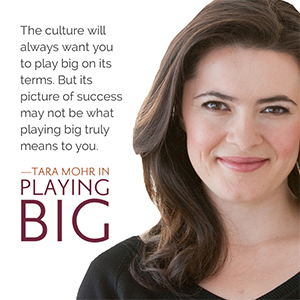
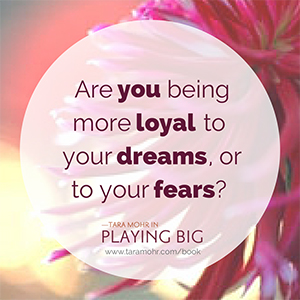
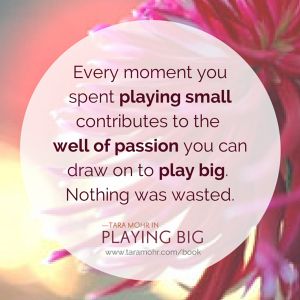
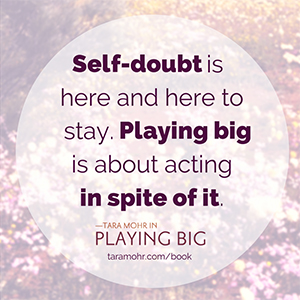

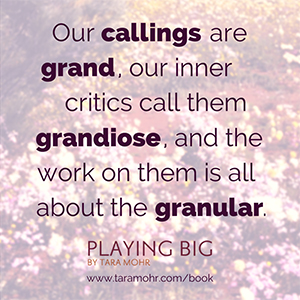
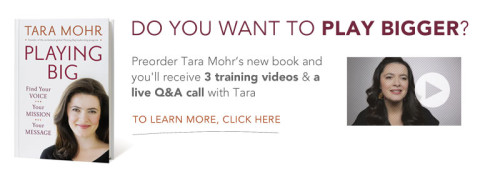
Nice interview Sue Ann. Thank you for introducing us to Tara. This touched on a lot of feelings that come along with running a business. It is nice to have those thoughts presented in such a thoughtful and caring way. The idea of success architecture really resonates with me right now. With any new business or even life in general, you struggle for a little bit until you have the right framework and support system. Once you have your success architecture in place…everything is dreamy. I love the way Tara presents her ideas and really look forward to reading her book.
Thanks! ….and welcome back.
Thanks Sue Ann!
I was on the call during this interview, but the thrill of these comforting words was wonderful to read all over again. Without the community of playing big women…I don’t know that I would have gotten to the place of what I love doing. Women like you have made all the difference. GREAT JOB on this article!
As divine timing would have it, I just got to see Tara talk about Playing Big this week at a conference I attended. She was wonderful and I’ve started her book.
Divine Timing: I was lucky enough to see Tara speak about Playing Big at a conference I attended this week.
She was wonderful and I have even started her book…love it!!
Wonderful Interview! I am a Playing Big graduate, and it was so wonderful to have some of the most important lessons in the class highlighted here so succinctly.
I look forward to hearing more about your Wise Business Initiative…
I have been following Tara for awhile now, she is spot on when she speaks of dreams, playing big and living closer to our purpose. Great interview Sue Ann.
I received an email today from another source pointing me in the direction of Tara’s work and new book. When I saw the title, I immediately brushed it off as not being for me (at least not yet) and deleted the email. Now I’m wondering if someone’s trying to tell me something I’m only on the verge of being able to hear. That quote about playing big IN SPITE OF self-doubt hits home and has helped shift that perspective enough to get me to listen to the interview…
Sue Ann, you’re the 2nd person to bring Tara and her new book to my attention in one day. When I first saw the title, my immediate reaction was, “That’s not for me (at least not yet)” and deleted the email. I will now, sheepishly, go dig it out of the trash. Maybe there IS something in here for me. This interview made me realize that playing big isn’t about rich and famous (necessarily), it about showing up fully as myself in whatever I choose to do. ” It’s about becoming visible to the people you want to influence or reach.” Love that! Thanks Sue Ann!
A generous and informative interview – so many great aha moments as I read through. Thank you Sue Ann.
Great conversation! Tara, sounds very inspiring. I have played big sometimes in my life, then retreated and been very invisible and come out again. Cycles within cycles. I am on a coming out cycle!
Wonderful interview with so much inspiration. It is always so great to see people embracing their dreams and helping others to do the same in the process! I really like her views on group support. Thank you for sharing this lovely interview!
what struck me the most about tara’s answers (to your thoughtful and meaningful questions) was her honesty. she wasn’t just saying what everyone tends to say. and that means a lot to me as i maneuver my way through my own entrepreneurial journey. “I guess I believe that if I’m expressing myself consistently, that will come across in a coherent brand.” this is what i have finally realized i’ve been doing all along. each time i reach out to my audience, i am truly who i am. and i am beginning to see that self-expression translate into momentum for my business.